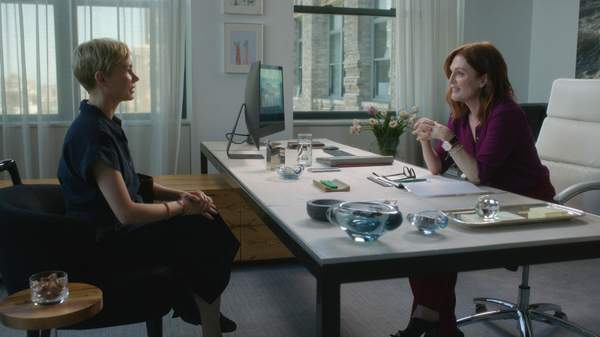Overview
It's easy to understand why Bart Freundlich, filmmaker and husband of Julianne Moore, decided to remake After the Wedding. A best foreign-language Oscar nominee in 2006, the original Danish feature is a thorny melodrama that's big on moral dilemmas, but even bigger on revelatory moments and performances — and gender-swapping the main characters, shifting the action to America and giving Moore a lead role was clearly too juicy an opportunity to pass up. So was casting his wife opposite Michelle Williams, another actor who can play steely and fragile in the same breath, excels at portraying complex, realistic women, and manages all of the above with the utmost subtlety. Indeed, if any uncertainty hovers over Freundlich's movie, it isn't "why?", but "why didn't it happen sooner?".
Perhaps the answer to the second query resides in After the Wedding's narrative, which acts like a Rorschach test for audiences. Some will see splotches of #firstworldproblems connected through convenient, even implausible twists. Others will notice how the film stresses the enormous chasm between the needy and the rich, refuses to trade in simplicity, and has meticulously calculated each and every plot development. Of course, both perspectives can prove accurate at once. A movie can seem neat, chaotic, overly structured and random in tandem, because life almost always does the same thing. Leaning into these contradictions actually deepens After the Wedding — as its conflicted characters are forced to navigate testing circumstances, Freundlich's film never even thinks of settling into a safe, cosy niche.
Location-wise, though, the opposite is true. After the Wedding is largely set in a privileged world, spending the bulk of its time in New York penthouses, offices and country estates. The film introduces Isobel (Williams) while she's meditating at the Kolkata orphanage she helps run, then whisks her across the globe to secure funding from business high-flyer Theresa (Moore) — and makes a point of stressing how uncomfortable Isobel is with the change of environment. That's the first major upheaval that pushes Williams' calm yet flinty character out of her comfort zone. When Moore's brittle hotshot demands that Isobel extends her trip and, even though they've just met, also insists that she attends her daughter's upcoming wedding, additional surprises follow. It's impossible to delve further into the plot without giving too much away; however Isobel is hardly thrilled when she meets Theresa's sculptor husband Oscar (Billy Crudup), or takes a proper look at Grace (Abby Quinn), the blushing bride.
The best moral dilemmas double as mysteries, inspiring a series of questions. How will the intricate plot pieces fit together? How will the various players respond? How will tussling with a life-altering scenario change everyone involved? After dropping the first big revelation early — his film is called After the Wedding, after all — Freundlich keeps the complications coming thick and fast, but takes time to revel in Isobel, Theresa, Oscar and Grace's reactions. That's the nuts and bolts of the movie, as relayed in heated altercations, awkward exchanges, pensive moments, and big breakthrough scenes that push Isabel and Theresa to their limits.
Naturally, Williams and Moore couldn't be better; fresh from stellar work in Fosse/Verdon and Gloria Bell, respectively, that's why the reliably excellent duo was cast. Without them, After the Wedding might've felt soapy, especially after discarding its predecessor's jittery camerawork for conspicuously smooth and gleaming visuals, but that's never the outcome. When a story loves thrashing in as many different directions as this one, it takes particularly textured and nuanced performances to hammer home its tender core, which is what Williams and Moore continually bring to the table. Elsewhere, Crudup is understated but underused in support, while Quinn holds her own with the film's high-profile leading ladies — and that's no mean feat.
The elephant in the room? It's the place where elephants are far more common, with Isabel's life in India — and her bond to eight-year-old Jai (Vir Pachisia), the abandoned boy she's become a replacement mother to — never fading from view. Still, while she's desperate to return and keep making a difference, hers is never a clumsy white saviour tale. This part of the story is noticeably blunt, as are the film's other attempts to address class differences (as Isabel rattles off stats about child prostitution to Theresa, they're interrupted by a catering snafu over a lack of lobster, for example), yet the instinct to grapple with one's issues by helping others rings true. Perhaps surprisingly given how many twists it strings together, After the Wedding proves affecting and engrossing in general for the same reason: no matter what the film throws at the screen, its heaving emotional landscape always feels devastatingly real.
Features
Information
When
Thursday, October 24, 2019 - Wednesday, November 13, 2019
Thursday, October 24 - Wednesday, November 13, 2019
Where
Select cinemas in MelbourneVarious locations
Price
$15–25-
Event Type
